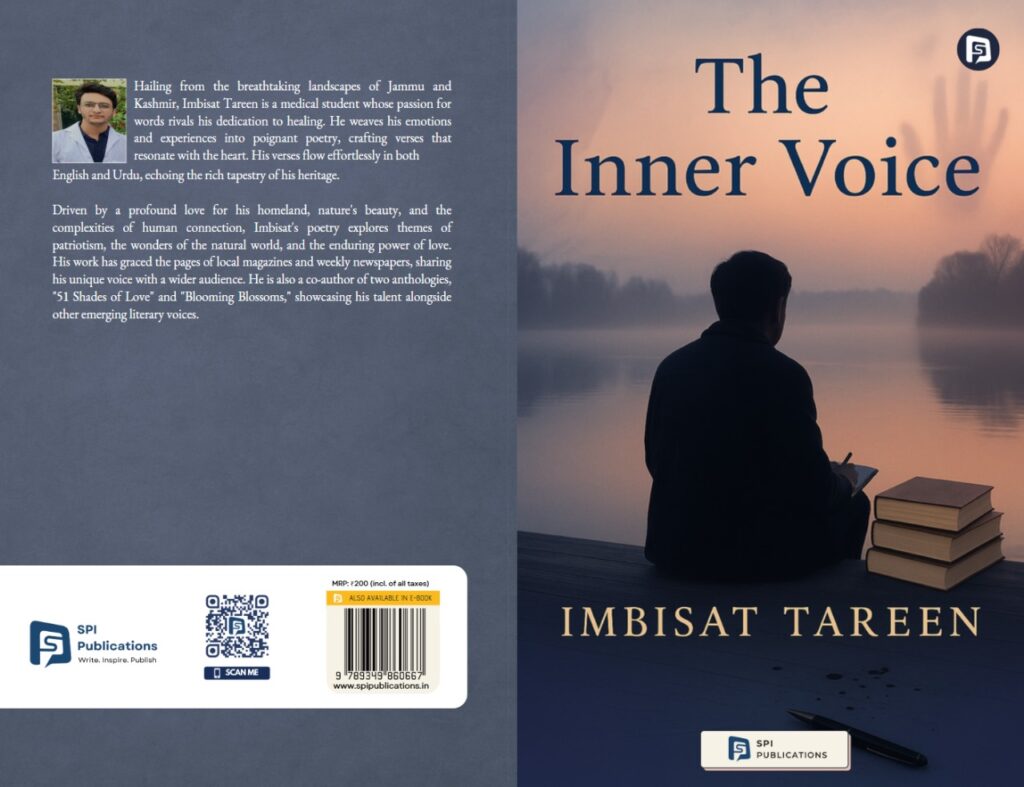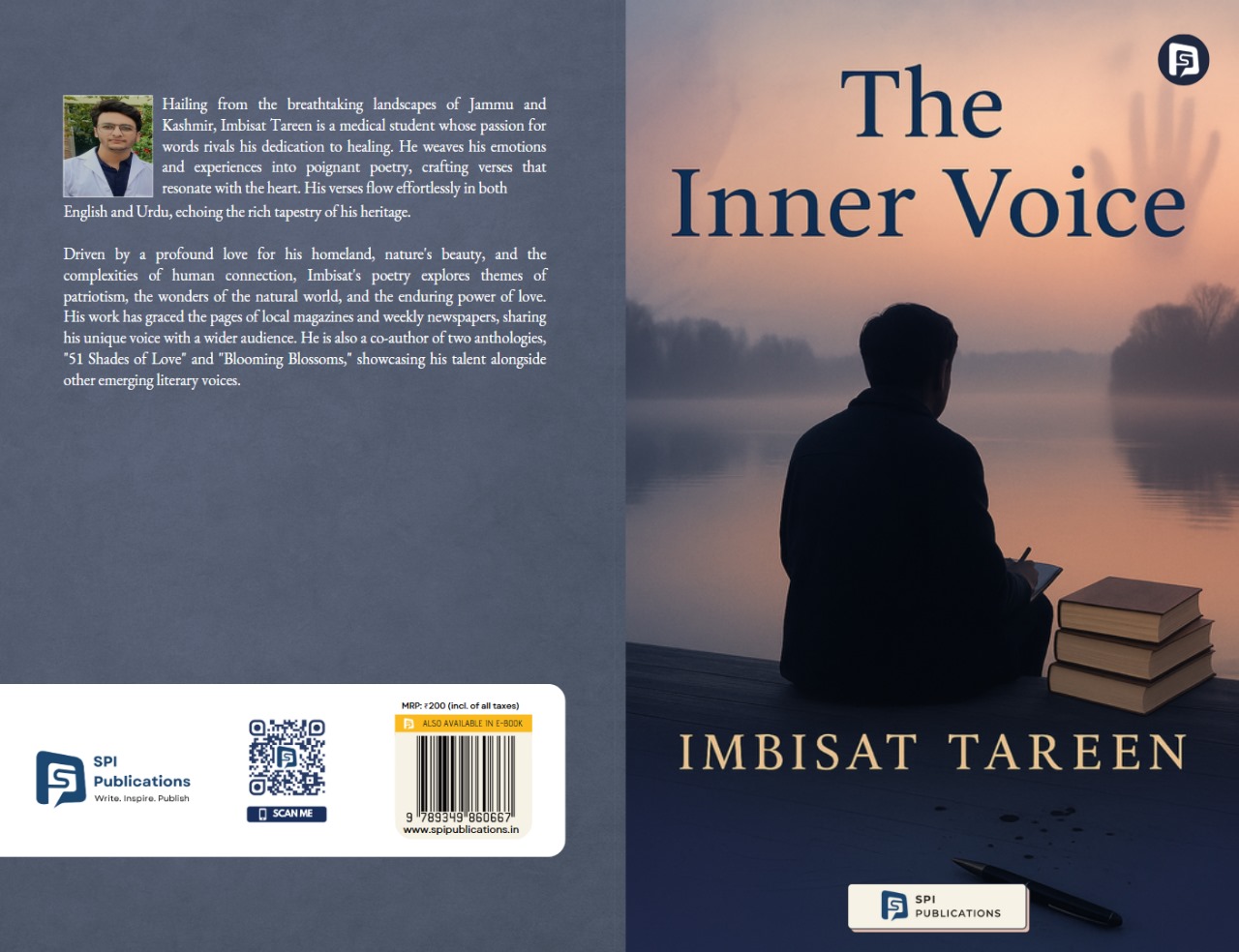By Aubaid Akhoon
There are voices that rise in the noise of bustling crowds, and then there are those that emerge from a sacred stillness within — delicate, unannounced, and deeply personal. While many books attempt to capture the clamour of the world, The Inner Voice by Imbisat Tareen does something more daring: it leans into the hush, listening to the soul’s faintest whispers. This collection of poetry is not merely a gathering of verses; it is a young poet’s intimate dialogue with life, pain, wonder, and awakening — composed in solitude, and offered with disarming vulnerability.
In an era of literary exhibitionism, where verbosity is too often mistaken for depth, The Inner Voice distinguishes itself through restraint and authenticity. The poet, hailing from the breathtaking yet burdened valleys of Jammu and Kashmir, does not raise his voice to be heard. Instead, he opens his heart and lets it speak softly. The result is a book that does not just demand to be read — it quietly asks to be felt.
For me, however, this book is more than a poetic debut. It is a deeply personal milestone, for I once knew Imbisat Tareen not as a poet, but as a young student — thoughtful, observant, and filled with potential. Watching him evolve from a blooming bud in the classroom into a published writer capable of evoking such depth of emotion has been a rare privilege, a joy that only teachers truly understand. His transformation is not just a literary journey; it is a testament to growth, perseverance, and the flowering of an inner world long in the making.
Within the pages of The Inner Voice, the reader is invited into a tapestry woven with raw emotions. Poems like Parents, In a Cage, Tears and Love, Snowfall in Summer, and The Diamond in the Dark Night sketch portraits of love, longing, sorrow, and silent strength. These are not verses draped in linguistic finery; they are born of truth and vulnerability. Imbisat does not hide behind elaborate metaphors or try to impress with intellectual gymnastics. His poetry is direct, heartfelt, and profoundly human — the kind that speaks not just to the intellect but to the spirit.

What further elevates the collection is the way nature pulses through its pages — not merely as scenery, but as silent witness and symbol. The rivers, mountains, snowflakes, and caged birds are more than poetic devices; they are subtle emblems of a deeper longing, perhaps even quiet reflections of Kashmir’s lived reality. The conflict and tension of the region are never shouted aloud, yet their presence lingers in the margins, between the lines. It is a silence that speaks — of both beauty and burden — and invites the reader to listen with care.
Imbisat’s Kashmir breathes in his poetry: the scent of spring after a harsh winter, the silence of snowfall, the ache of distance, and the resilience of blooming flowers in unlikely soil. His verses, while deeply personal, also serve as a gentle mirror of collective yearning — for peace, for connection, for the freedom to dream.
And as someone who has witnessed his journey up close, I cannot help but reflect on the arc of transformation that this young poet has traversed. I remember the gleam in his eyes during quiet classroom discussions, his sensitivity to the unspoken, and the quiet discipline with which he observed the world around him. Today, those same eyes offer us a window into a soul matured by contemplation, and a voice enriched by emotional courage. To see a student transcend his role and step into the world as an artist is a moment of deep fulfilment — one that lingers like a warm afterthought long after the final page has been turned.
In a literary landscape increasingly shaped by market trends, hashtags, and algorithm-driven popularity, The Inner Voice is refreshingly uncalculated. It does not pander to formulas nor seek the spotlight. Instead, it trusts in the timeless power of sincerity. It offers solace to those who find themselves lost in their own inner storms and gently reminds us that even the quietest voices can echo loudly in the chambers of the heart.
This book matters not because it is perfect, but because it is real. It matters because it dares to feel. And in a world where numbness has become a defense mechanism, that alone is a triumph. The Inner Voice is not just a collection of poems; it is a companion for moments of solitude, a gentle reassurance that we are not alone in our unspoken struggles.
I wholeheartedly recommend this book to every lover of poetry, to those who cherish emotional depth over linguistic ornamentation, and to anyone who still believes that literature is meant not just to dazzle, but to heal. May Imbisat Tareen continue to grow, and may his verses — born of silence, soaked in truth — find their way into hearts far beyond the valleys that first inspired them.
The views expressed in this article are solely those of the author and do not necessarily reflect the opinions or views of this newspaper. The author can be reached at [email protected]
